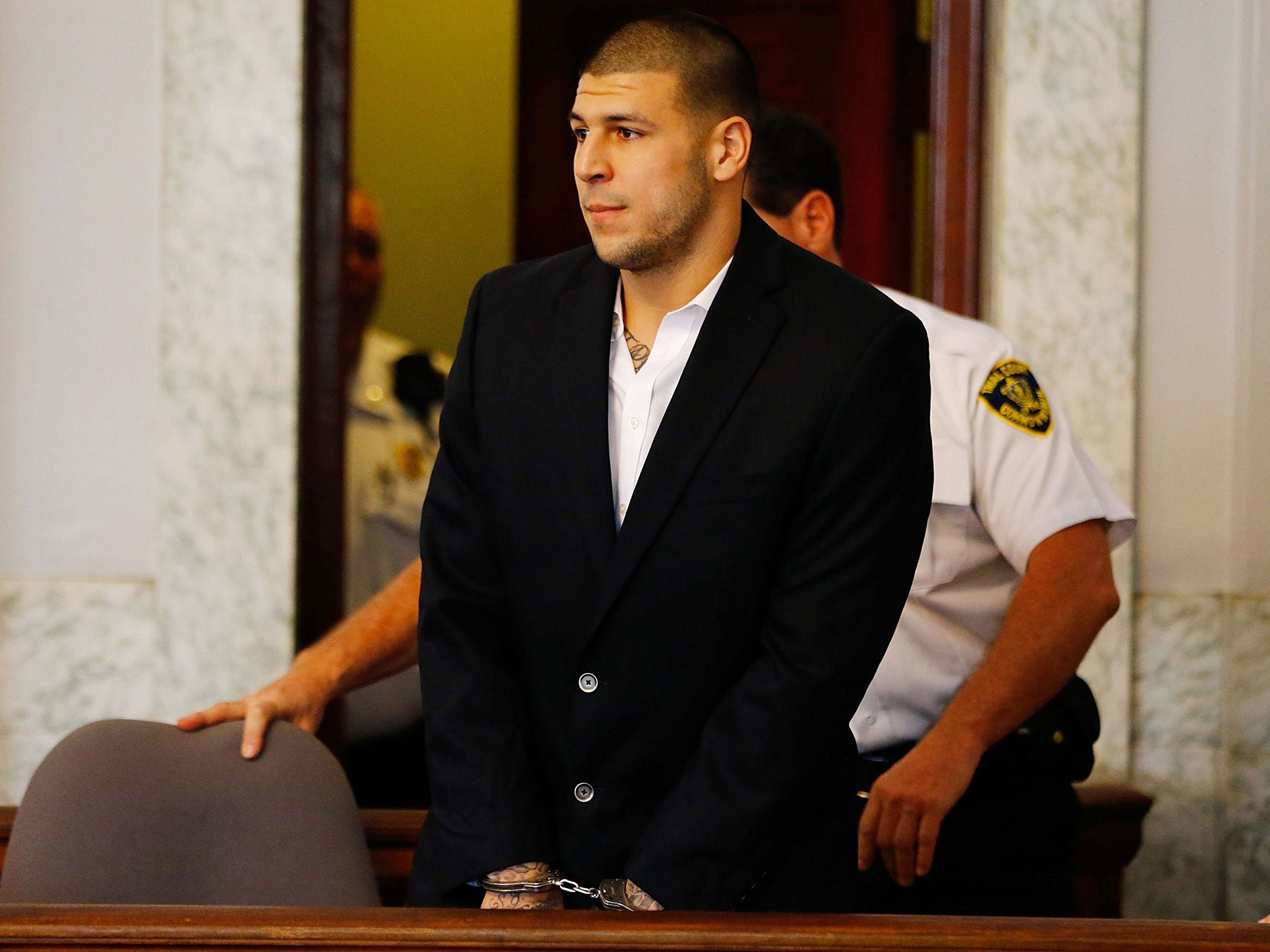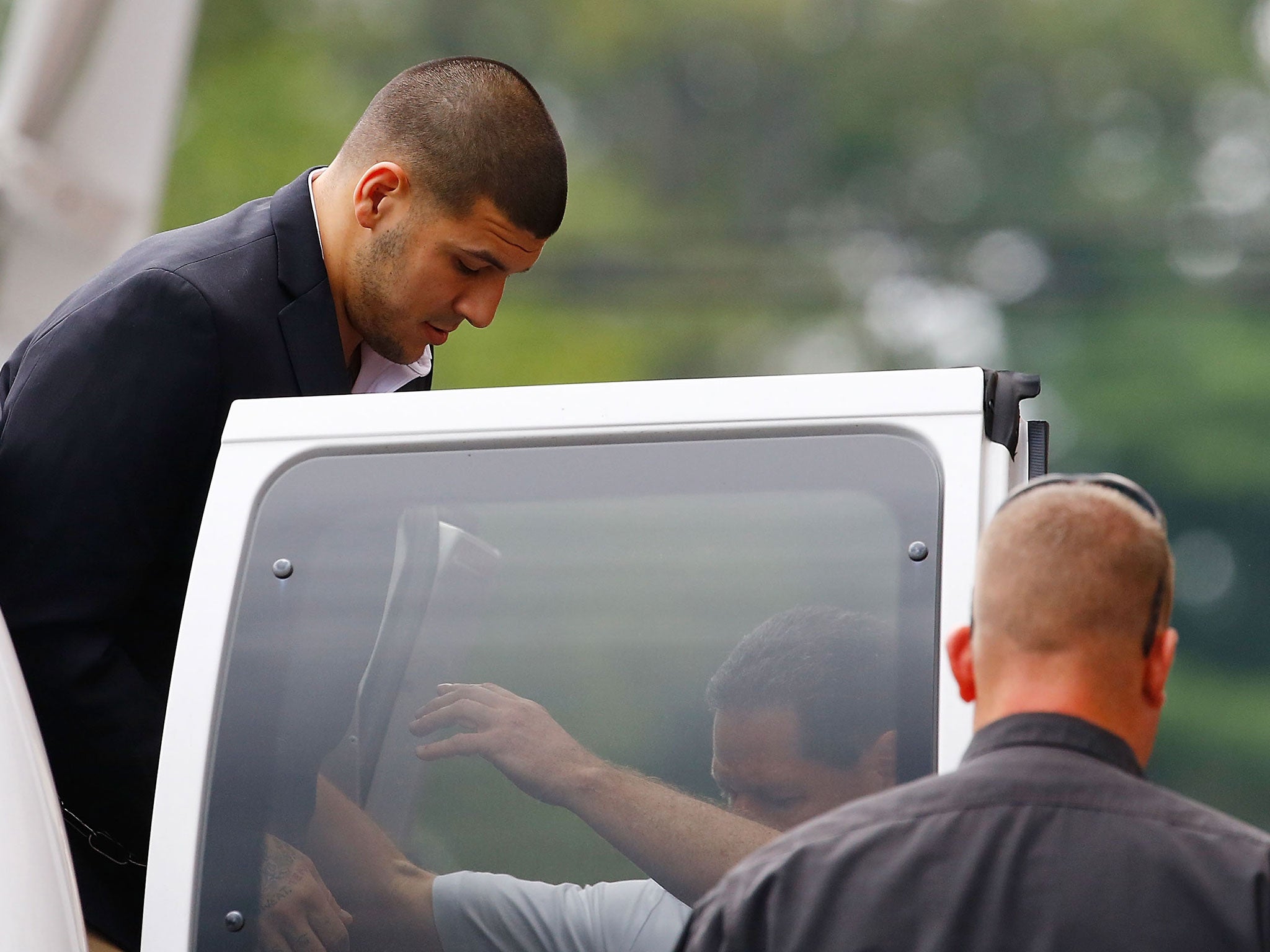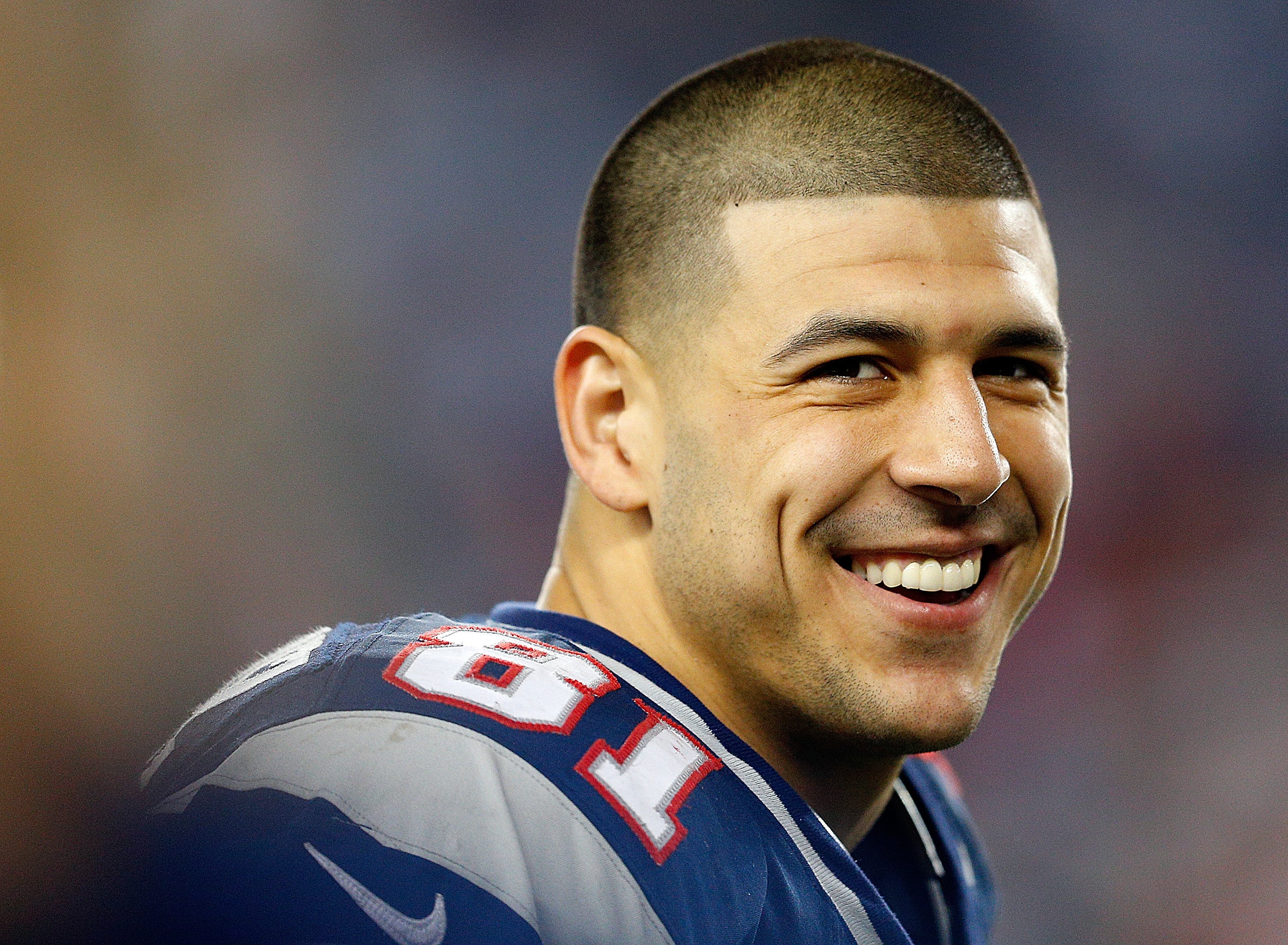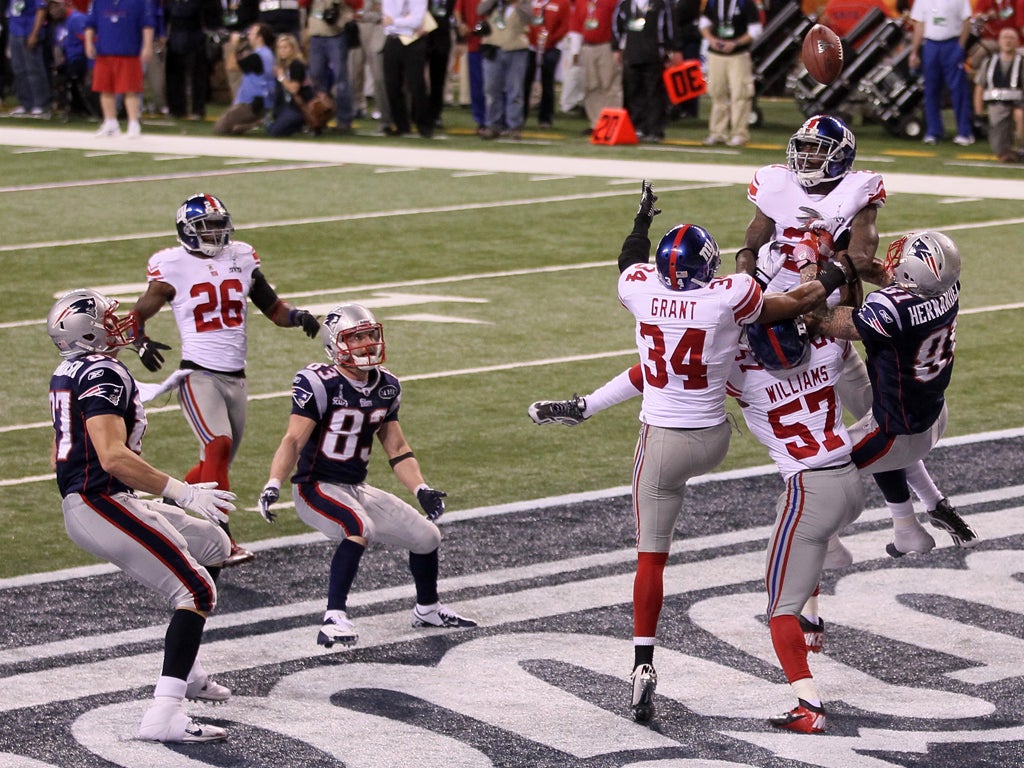Aaron Hernandez: Former New England Patriot used to be one of NFL's brightest talents, but now spends his time fighting murder charge
Aaron Hernandez used to be one of the brightest talents in the NFL. Now, at just 24, his days are spent in a Massachusetts courthouse fighting the charge that he brutally murdered a close associate. His case is the latest in a series of scandals to engulf America’s richest sport

For nine weeks now in the old Massachusetts mill town of Fall River, TV satellite trucks have been lining Borden Street, next door to the courthouse. The street is named after Lizzie Borden, Fall River’s most famous citizen who back in 1892 was accused of taking an axe to her parents, in one of the most notorious murder cases in US history.
Now another trial is unfolding, scarcely less sensational. Aaron Hernandez, until recently a star player for the New England Patriots of the National Football League, is charged with the killing of a friend in June 2013. Separately, while being held without bail awaiting trial, he was indicted for two other murders in nearby Boston a year before.
In other words, Hernandez may have played the entire 2012 season for the Patriots as a double murderer. American sport has never seen anything like it. OJ Simpson was an even better known player, whose trial in 1994-95 may have generated larger headlines – but Simpson’s alleged double murder took place 15 years after he retired from the NFL. His was a tale of rage and jealousy. Hernandez story is no less sad. He is, it seems, a young man with two faces: a gifted athlete by day and psychopathic street thug by night and, if prosecution evidence is believed, a kid who set himself up for life and then, seemingly, threw it all away.
The victim in this first trial was Odin Lloyd, a semi-pro footballer and friend of Hernandez who was dating the sister of the NFL player’s fiancée. On June 17 2013, Odin’s body was found in a disused industrial park a mile from Hernandez’s home. He had been shot to death, execution- style. A mass of circumstantial evidence implicated Hernandez, and a week later prosecutors charged him with first-degree murder. The motive, they suggested, was paranoiac rage at two trivial perceived slights from Odin at a club two nights before. Drugs, they claimed, may have helped fuel his anger.

But for Hernandez, such behaviour was nothing new. Over the months after his arrest, a fuller picture emerged, of a football player both hugely talented and endemically violent. The turning point seems to have been the death of his father in 2006, when Aaron was 16. Dennis Hernandez’s early career, a local sports star in Bristol, Connecticut, who had got involved with gangs, guns and crime, mirrored his son’s.
But Dennis turned his life around, and devoted himself to ensuring his sons, Aaron and brother David, would not make the same mistakes. His death, by all accounts, removed the one anchor in Aaron’s life. After dazzling in high school football, a host of colleges were after his services. He had planned to stay in Connecticut. Instead, traumatized by the loss of his father, he “escaped” to the University of Florida.
There, Hernandez was linked with various violent off-field incidents. He also used drugs. But major college football programmes are both powerful and immensely protective of their stars, and Florida’s Gators were no exception. Hernandez continued to play football, so successfully that he decided to skip his final year and enter the 2010 NFL draft.

NFL teams, however, have even more thorough scouting operations, and at least a dozen concluded that Hernandez’s character and record made him just too big a risk. Measured purely by talent, he might have been a first-round pick. As it was, he was only taken by the Patriots in the fourth round.
Why the Patriots took a chance when others held back is unclear. Maybe they genuinely thought they could straighten him out; maybe coach Bill Belichick, already implicated in various scandals, was once again cutting corners, faithful to his creed of winning whatever it took.
Whatever the reason, Hernandez had fallen on his feet. His new employers were the NFL’s dominant franchise, three-time Super Bowl winners under Belichick between 2002 and 2005. Aged just 20, he started his rookie 2010 season as the youngest player on the NFL’s active roster and quickly made his mark. In the 2012 Super Bowl, he connected with a 12-yard pass from the Patriot’s quarterback Tom Brady for a touchdown. New England ultimately lost, but Hernandez had emerged as a genuine star, one half of an umatched tight-end duo with Patriots’ cult hero Rob Gronkowski, aka ‘Gronk.’
Both had a lethal combination of speed and bulldozing power. Combined, they set a host of records for tight ends, a position that is part receiver, part offensive linesman. That summer, the Patriots signed Hernandez to a five-year $40m contract extension, including a $12.5m signing bonus, a record for a tight end. By now his fiancée Shayanna Jenkins had made him a father as well. All seemed set fair.
Instead, all went from bad to worse. Part of the trouble was the familiar one, of a young man suddenly with the wealth to buy anything he wanted. But he also fell back into the mean-streets gangster world that in reality he had never left. On 1 February, 2015, New England defeated Seattle to clock up its fourth Super Bowl under Belichick. Meanwhile, a man who, had things gone differently would have been in their starting line- up, was on trial for murder.

And so to the central riddle of the whole affair: why? Maybe Hernandez thought he could get away with it. After all, he appeared to have got away with it in Florida, and did not the image-conscious NFL protect its own, as it had with Ray Rice? Rice was a star running back for the Baltimore Ravens, who had beaten his fiancée. The matter was swept under the rug – until a security video went public showing him punching her in the face and knocking her to the ground, forcing the NFL to act.
Murder charges, however, are a different matter. The instant the Odin Lloyd indictment was handed down, the Patriots released Hernandez, and cancelled the rest of the $40m contract. Even if he is acquitted, whatever money remains will probably be consumed by lawyers’ fees, and damages in civil lawsuits brought by the victims’ relatives.
Yet however sordid, the Hernandez case is rarely cited among the woes that currently assail the NFL: first and foremost among them the proven risk of brain damage caused by repeated concussions in a savage sport, dangerous even at high school level. Earlier this month, another highly rated NFL rookie, Chris Borland of the San Francisco 49ers, also threw away a king’s ransom in future earnings – but in his case voluntarily. The risk of chronic depression and dementia in later life, Borland said, outweighed no matter how much money.
For now the $10bn juggernaut that is the NFL is surely safe, but a generation hence, who knows? Parents increasingly are reluctant to let their children play – even President Obama has said that if he had a son, he would advise him against football. In the long run, some warn, football could go the way of boxing, in its heyday an outlet for poor kids from tough neighbourhoods who were ready to risk long-term health for wealth.
Once upon a time, the punch-drunk old fighter was said to suffer from a condition known as dementia pugilistica. Today it’s called chronic traumatic encephalopathy, or CTE, with which at least 70 former NFL players have been diagnosed, driving a few of them to suicide.
Not coincidentally, the surge in the League’s popularity and revenue has coincided with the collapse into irrelevance of the heavyweight division, boxing’s one-time flagship and the preserve of American sporting legends from Jack Dempsey through Joe Louis and Muhammad Ali to Mike Tyson. Now, however, the troubled youth who might have been a 220lb champion in the ring, bulks himself up into a 270lb linebacker in the NFL.
Then there’s the domestic violence issue, epitomised by the likes of Rice and Adrian Peterson, the Minnesota Vikings running back charged with abuse of his four-year old son, and the casual gun culture that ensnared Plaxico Burress, of the New York Giants, who in 2008 contrived to shoot himself in a Manhattan nightclub with an unlicenced pistol.
At first glance, the Hernandez case might seem an extreme mutation of the hyper-macho ethos of the NFL, for whose modern-day gladiators chivalry is unknown, where quarter is neither asked nor given, and where only wimps leave the field because of pain and injury.
In fact, Hernandez’s alleged crimes are not a product of his time in the NFL, but of how he grew up. Blame the Patriots perhaps for taking him, but they did not make him the person he now appears to be. He is accused not of a hot-headed impulsive act, but of a premeditated gangland-style execution.
Much the same goes for the deaths of Daniel de Abreu and Safiro Furtado, two Cape Verdeans who got into a petty argument with Hernandez in a Boston nightclub in 2012. Shortly after leaving, they were gunned down from a passing car. The evidence against Hernandez in this crime – involving gun, car and eyewitness testimony – seems at least as strong as the Odin Lloyd case.
Right now, the verdict in Fall River is anyone’s guess. There is no direct eyewitness and no murder weapon, but a mountain of circumstantial evidence. Shayanna Jenkins is yet to take the stand; whether Hernandez, who maintains his innocence, will also do so is unclear.
Like OJ Simpson two decades ago, he can afford pricey lawyers, whose strategy will be to blame the murder on the excess zeal of two co-defendants, strong-arm associates of Hernandez whom the NFL player took with him that night. Probably the defence will argue the whole thing was an effort to scare Lloyd, and maybe rough him up a little bit, that went tragically wrong. And who knows? After all OJ, of whose guilt in murdering his wife most Americans are convinced, was acquitted. So, incidentally, was Lizzie Borden.
Bookmark popover
Removed from bookmarks